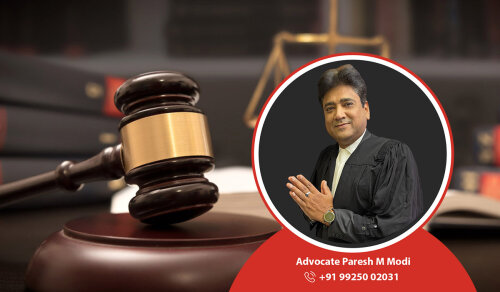Best Drug Crime Lawyers in Ahmedabad
Share your needs with us, get contacted by law firms.
Free. Takes 2 min.
List of the best lawyers in Ahmedabad, India
About Drug Crime Law in Ahmedabad, India
Drug crimes are taken very seriously in Ahmedabad, India. The city has strict laws and regulations in place to combat the illegal drug trade and to protect the community from the harmful effects of drugs. Drug offenses can lead to severe penalties, including imprisonment and hefty fines.
Why You May Need a Lawyer
Legal assistance is crucial when facing drug crime charges in Ahmedabad, India. A lawyer specializing in drug crimes can provide valuable guidance and representation throughout the legal process. They can help protect your rights, build a strong defense, negotiate plea deals if applicable, and reduce potential penalties.
Local Laws Overview
Ahmedabad follows the Narcotic Drugs and Psychotropic Substances Act (NDPS Act) of 1985, which is the main legislation governing drug offenses in India. Under this act, the production, manufacture, possession, transportation, import, export, and consumption of illegal drugs are considered criminal offenses. The act classifies drugs into different schedules, with each carrying its own set of penalties.
Frequently Asked Questions
1. What are the penalties for drug offenses in Ahmedabad?
The penalties for drug offenses vary depending on the severity of the offense and the type and quantity of drugs involved. They can range from imprisonment for a few years to lifelong imprisonment and large fines.
2. Can I be charged with a drug offense even if I only had a small amount of drugs?
Yes, possession of even a small amount of illegal drugs is considered a criminal offense in Ahmedabad. The amount and type of drugs found can influence the severity of the charges and the resulting penalties.
3. Are there any legal defenses against drug crime charges?
Yes, there are several potential legal defenses against drug crime charges. These may include challenging the legality of search and seizure, proving lack of knowledge or intent, questioning the chain of custody of evidence, or challenging the reliability of test results. Consult with a lawyer to understand the best defense strategy for your specific case.
4. Can I get bail if I am charged with a drug offense?
Obtaining bail for drug offenses depends on various factors, such as the nature of the offense, the quantity of drugs involved, and your criminal history. Generally, bail is possible, but it is ultimately up to the discretion of the court.
5. Should I cooperate with the police if I am arrested for a drug offense?
It is recommended to remain silent and not answer any questions until you have legal representation present. Cooperating with the police without legal advice can potentially harm your defense. Always consult with a lawyer before providing any statements to law enforcement.
Additional Resources
For more information and assistance regarding drug crimes in Ahmedabad, India, you can consider reaching out to the following resources:
- Narcotics Control Bureau (NCB): The NCB is the central agency responsible for enforcing drug laws in India.
- Legal Aid Services: Seek assistance from legal aid organizations, such as the Legal Services Authority, for free or subsidized legal advice and representation.
- Local Bar Association: Contact the Ahmedabad Bar Association to find qualified lawyers specializing in drug crime defense.
Next Steps
If you require legal assistance in a drug crime case in Ahmedabad, India, it is advisable to:
1. Consult with a specialized drug crime lawyer to discuss your situation and understand your legal options.
2. Provide your lawyer with all relevant information and cooperate fully to build a strong defense.
3. Follow your lawyer's advice and guidance throughout the legal process.
4. Attend all court hearings and proceedings as required.
5. Maintain open and honest communication with your lawyer.
Lawzana helps you find the best lawyers and law firms in Ahmedabad through a curated and pre-screened list of qualified legal professionals. Our platform offers rankings and detailed profiles of attorneys and law firms, allowing you to compare based on practice areas, including Drug Crime, experience, and client feedback.
Each profile includes a description of the firm's areas of practice, client reviews, team members and partners, year of establishment, spoken languages, office locations, contact information, social media presence, and any published articles or resources. Most firms on our platform speak English and are experienced in both local and international legal matters.
Get a quote from top-rated law firms in Ahmedabad, India — quickly, securely, and without unnecessary hassle.
Disclaimer:
The information provided on this page is for general informational purposes only and does not constitute legal advice. While we strive to ensure the accuracy and relevance of the content, legal information may change over time, and interpretations of the law can vary. You should always consult with a qualified legal professional for advice specific to your situation.
We disclaim all liability for actions taken or not taken based on the content of this page. If you believe any information is incorrect or outdated, please contact us, and we will review and update it where appropriate.
















